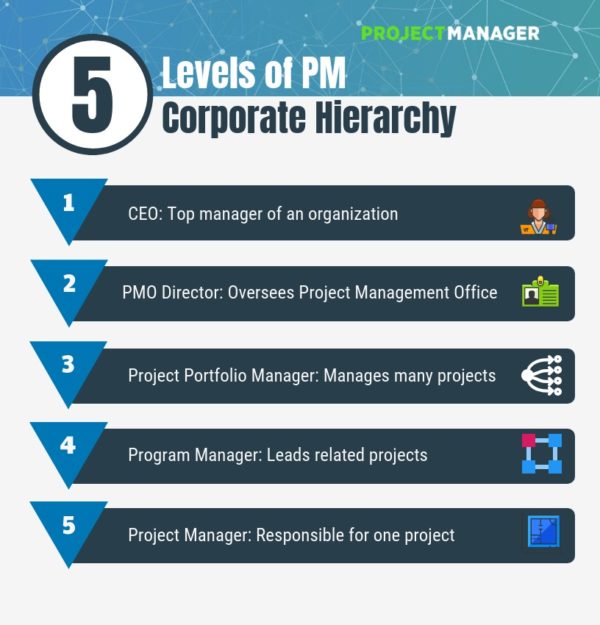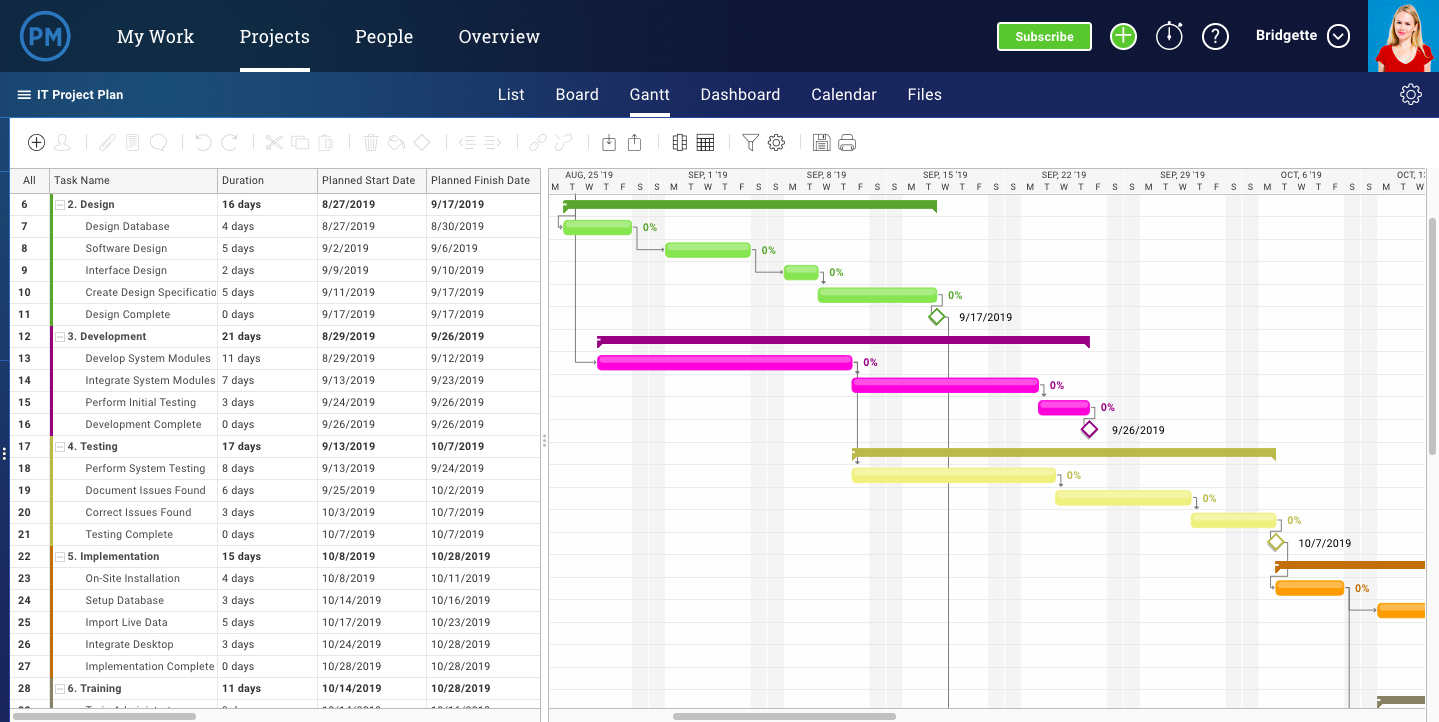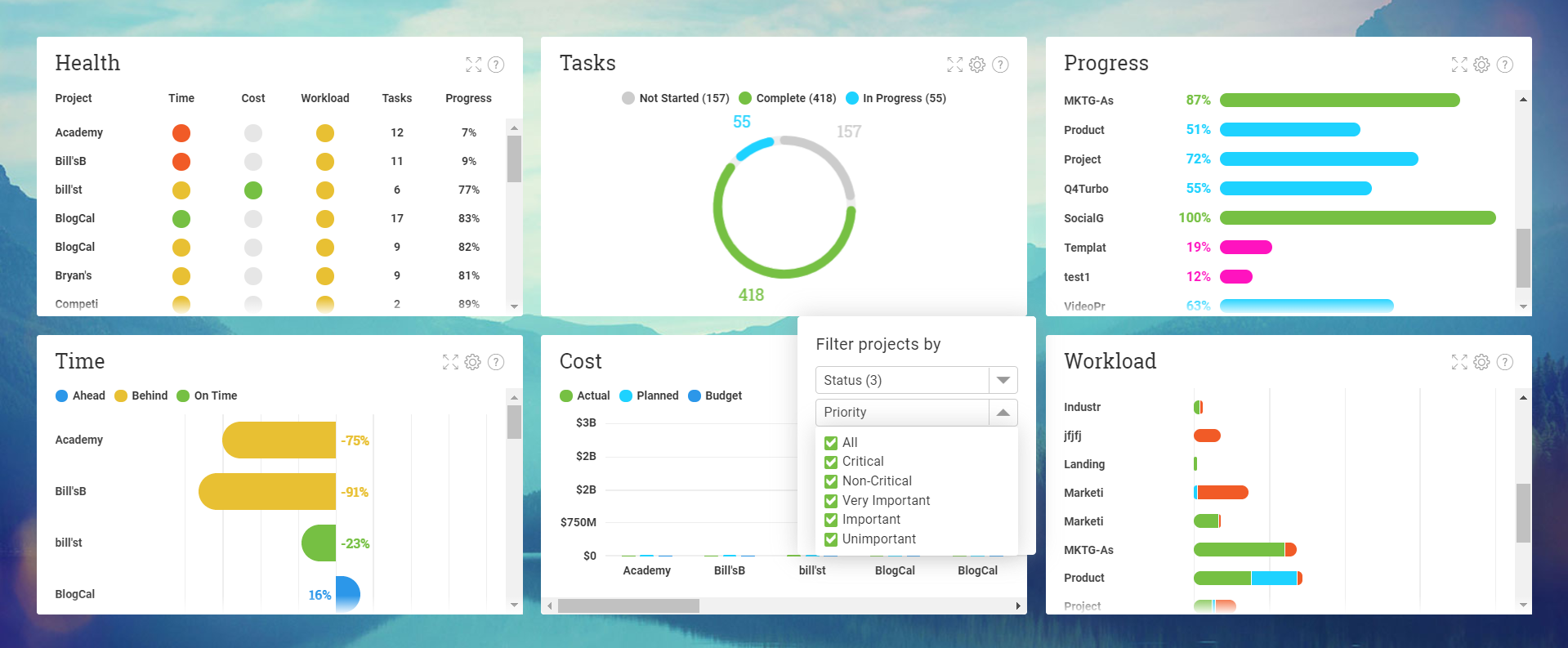Managing a project requires juggling many different tasks at once—it’s no easy feat. But what if you had to manage multiple projects at once? That’s program management in a nutshell.
A program is many projects linked together in order to match one overall business objective. And while that might sound like a hefty task at hand, it’s nothing short of doable for a program manager. Program management, then, is the discipline of linking together multiple projects simultaneously to ensure all projects are integrated for increased synergy across all teams.
But what does it mean when it comes to executing proper program management in the everyday? Let’s start with the basics.
What is Program Management?
Program management is the process of managing several projects and programs simultaneously to streamline organization and productivity. By prioritizing resources across projects, program management works to make all projects more efficient for long-term stability.
Program management is a process that focuses on macro over micro, which includes:
- Checking in on programs and performing daily management activities
- Overseeing budgets for each program
- Managing both resources and communications across all projects with their stakeholders
- Ensuring that project deliverables match with the overall business objectives
- Coordinating all program documents with project interdependencies, ensuring that they’re all on the same page
Program management also addresses risk management, quality control, managing stakeholder communications and reporting. It is a process that helps make projects successful and involves many management decisions at every stage.
What program management is not:
- Handling the day-to-day minutiae of a single project and its tasks
- Choosing, prioritizing and ensuring all projects and programs make sense for the company’s objectives
- Selecting the right products at the right time
- Focusing on project execution
- Tracking and reporting on specific project constraints
Program Manager vs Project Manager
The qualities of a great program manager include being more diplomatic and charismatic than their project manager counterparts in an effort to manage stakeholders, project managers and team members with varying project goals.
Related: How to Make a Stakeholder Management Plan
This differs from a project manager in that project managers are required to be detail-oriented and great with numbers, with an eye for hyper efficiency to keep projects on track, but are not necessarily expected to be diplomatic. Additionally, program managers are big picture thinkers, always considering the ultimate business objectives across all projects, ensuring that none of their programs fall out of line. On the flip side, project managers are not necessarily worried about big picture goals.
Unique challenges that many program managers face include:
- Managing multiple projects at once
- Keeping all project managers and projects aligned on the singular big picture business objectives
- Managing stakeholders expectations and ensuring that all project members are on board
- Verifying that all budgets and resources are available at multiple points throughout the project
Whereas project managers face the unique challenges of:
- Managing the detailed elements of a single project
- Tracking, quantifying and reporting on the specific ups and downs of their project status
- Allocating resources, budget, dependencies, time and tasks—while mapping them out within a given project scope
- Planning, budgeting, monitoring and reporting on the progress of their project
There are also portfolio managers, who are different from both project managers and program managers in that they deal with choosing, prioritizing and ensuring that all projects and programs make sense for the company’s objectives. Additionally, they are focused on getting the most value for the money it takes to roll out a project by using thorough research to identify the correct time and place for the rollout.

Program Management Tools
There is no program too large or small for a program manager. But to execute program management strategies successfully, many program managers have to lean heavily on tools to get the job done. Here are a few popular program management tools.
Gantt Charts
Why has the Gantt chart continued to be one of the most popular tools with program managers? Because Gantt charts allow program managers to see tasks in a timeline format and create dependencies to keep project progress going. Gantt charts also allow program managers to easily link tasks with their dependencies within and across multiple projects—something that program managers need on a daily basis.

Reporting Tools
Between keeping stakeholders happy and keeping all team members on the same page, getting a good reporting tool is of ultimate importance for program managers. Whether it’s downloading data around a project status, tasks, timesheet and more—program managers can easily get the stakeholders and leadership staff on the same page with reporting tools.
Task Management
This is typically reserved for the more nitty-gritty problem areas during program management but is still highly beneficial. Task management helps program managers improve productivity across all projects. With a task management tool, managers can filter by the due date, owner, project and more. They can also plan for efficiency by sharing and collaborating tasks with project managers so they know the most recent directive for their project.
Time Tracking
They say time equals money, and nowhere is this more important than with program management. As the director of multiple projects, having visibility into timesheets is crucial. Program managers need to see where productivity is being spent and report successes with top management and stakeholders.
Program Management Certification
The Project Management Institute offers a Program Management Professional (PgMP) certification. To even qualify for this program, you have to have a secondary degree, plus 6,000 hours of project management experience and 10,500 hours of program management experience. For program managers with a four-year degree, however, it only takes a little bit of program management experience plus 6,000 hours of project management experience.
But there are many reasons to actually get your PgMP certification. Getting certified shows that you’re serious about program management and that you not only have the experience needed to rise to the top of a resume pile but also have the actual knowledge and skills it takes to make projects successful on a company-wide level.
Program Management Industries and Roles
Since program managers are similar to change agents, there can be many roles to fulfill at one time, including program manager, planning coordinator, senior user and more. They need to have the people skills to be able to be an effective communicator and leader, but at the same time need the analytical skills to objectively view and report on their projects’ successes.
Many program managers are located in Silicon Valley, Washington D.C. and Chicago, IL as many program managers work in IT companies, the tech industry, the engineering industry and others.
How ProjectManager.com Helps with Program Management
ProjectManager.com has everything you need to manage projects, programs, stakeholders and team members. With ProjectManager.com, you get access to Gantt charts that let you create dependencies across tasks in different projects in your program. You can also have automated reporting that lets you track portfolio status, project status, workload and more. Our workload features even allow you to track how your team is being best utilized within the different projects in your program.

Program management is a deeply involved, high-level practice that includes one individual or a team of program managers overseeing multiple projects. Without proper tools in place to manage all of the projects and portfolios at once, important tasks can slip through the cracks. Start a free 30-day trial of ProjectManager.com today and get award-winning program management tools to make your life easier.
No comments:
Post a Comment